高级英语第五课修辞手法分析
《高级英语》课程中的修辞研究
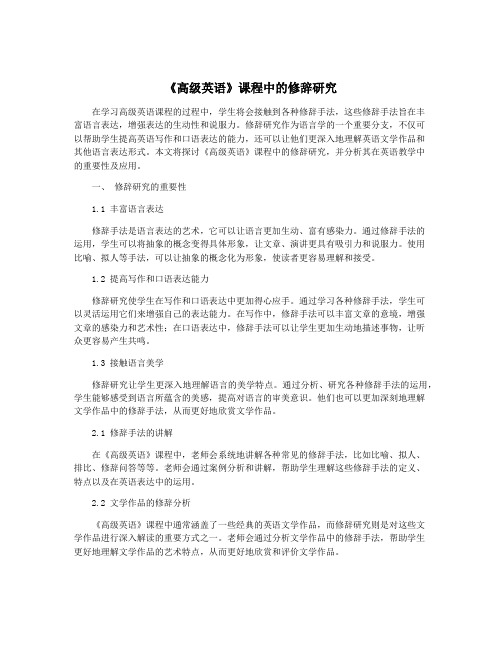
《高级英语》课程中的修辞研究在学习高级英语课程的过程中,学生将会接触到各种修辞手法,这些修辞手法旨在丰富语言表达,增强表达的生动性和说服力。
修辞研究作为语言学的一个重要分支,不仅可以帮助学生提高英语写作和口语表达的能力,还可以让他们更深入地理解英语文学作品和其他语言表达形式。
本文将探讨《高级英语》课程中的修辞研究,并分析其在英语教学中的重要性及应用。
一、修辞研究的重要性1.1 丰富语言表达修辞手法是语言表达的艺术,它可以让语言更加生动、富有感染力。
通过修辞手法的运用,学生可以将抽象的概念变得具体形象,让文章、演讲更具有吸引力和说服力。
使用比喻、拟人等手法,可以让抽象的概念化为形象,使读者更容易理解和接受。
1.2 提高写作和口语表达能力修辞研究使学生在写作和口语表达中更加得心应手。
通过学习各种修辞手法,学生可以灵活运用它们来增强自己的表达能力。
在写作中,修辞手法可以丰富文章的意境,增强文章的感染力和艺术性;在口语表达中,修辞手法可以让学生更加生动地描述事物,让听众更容易产生共鸣。
1.3 接触语言美学修辞研究让学生更深入地理解语言的美学特点。
通过分析、研究各种修辞手法的运用,学生能够感受到语言所蕴含的美感,提高对语言的审美意识。
他们也可以更加深刻地理解文学作品中的修辞手法,从而更好地欣赏文学作品。
2.1 修辞手法的讲解在《高级英语》课程中,老师会系统地讲解各种常见的修辞手法,比如比喻、拟人、排比、修辞问答等等。
老师会通过案例分析和讲解,帮助学生理解这些修辞手法的定义、特点以及在英语表达中的运用。
2.2 文学作品的修辞分析《高级英语》课程中通常涵盖了一些经典的英语文学作品,而修辞研究则是对这些文学作品进行深入解读的重要方式之一。
老师会通过分析文学作品中的修辞手法,帮助学生更好地理解文学作品的艺术特点,从而更好地欣赏和评价文学作品。
在《高级英语》课程中,学生需要进行大量的写作和口语练习。
而修辞研究则为学生提供了丰富的表达方式,帮助他们在写作和口语表达中灵活运用各种修辞手法,从而提高表达的艺术性和有效性。
《高级英语》课程中的修辞研究

《高级英语》课程中的修辞研究修辞是文学创作和语言表达中广泛运用的技巧和手段,旨在让语言更加富有感染力和表现力。
《高级英语》课程中的修辞研究主要包括四个方面的内容:修辞手法、修辞分析、修辞批评和修辞应用。
一、修辞手法修辞手法是修辞学研究的核心内容,也是学生必须掌握的基本技巧。
其中,最常用的修辞手法包括比喻、拟人、夸张、反语、排比等。
1.比喻:比喻是将两个本来没有任何关系的事物进行类比,以便更好地说明一个概念或情感。
比喻可以使语言更加形象、生动,让读者更容易理解和接受作者的观点。
2.拟人:拟人是将非人物化的事物赋予人的特征和行为,让读者觉得它们像人一样具有思维、感情和行动能力。
拟人可以让文本更加感人、有趣,让读者更加易于产生共鸣。
3.夸张:夸张是用过度强调或夸大的手法来表达某种情感或强调某个观点。
夸张可以让语言更有张力和感染力,让读者更加注意到作者的意图。
4.反语:反语是用相反的话来表达自己的意图,通常用于表达讽刺、讥笑、批评等意味。
反语可以使语言更加幽默、深刻,让读者更加有舒适感和启迪性。
5.排比:排比是用类似的结构和构造来重复表达一种思想或情感。
排比可以使语言更加流畅、有韵律,让读者更加容易记住和理解作者的意图。
二、修辞分析修辞分析是对文本中所使用的修辞手法进行细致分析和解释。
对于高级英语学生来说,掌握分析修辞的技能至关重要。
在修辞分析中,学生需要关注以下几个方面:1.修辞手法的类型和目的:学生需要明确修辞手法是哪种类型、用于什么目的。
2.修辞手法的具体表现:学生需要找出文本中哪些地方使用了该修辞手法。
3.修辞手法的效果:学生需要说明修辞手法的使用会带来什么效果,比如增强感染力、产生幽默效果、强化情感表达等等。
三、修辞批评修辞批评是对文本中所使用的修辞手法进行批评和评价。
在进行修辞批评时,学生需要注意以下几个方面:1.修辞手法是否恰当:学生需要评估该修辞手法是否适合用于该文本的情境,是否符合文本的语气、风格和主题。
高级英语Lesson5修辞The Libido for the Ugly
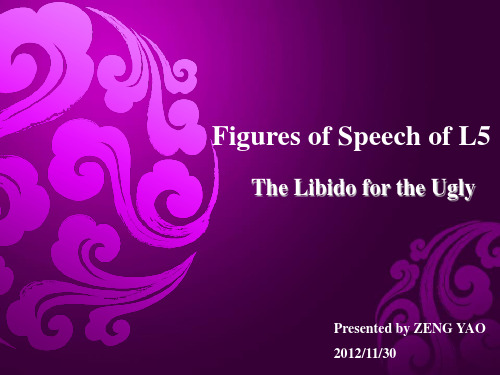
Theme: The innate love of ugliness in US is a pathological(病态的) problem. dreadful, hideous, bleak, appalling,
forlorn, revolting, macabre, monstrousness, leprous, misshapen, dingy, loathsome, obscene, putrid, ghastly, leprous, uremic, eczematous
Inversion
Parallelism
repetition
transferred epithet
Synecdoche 提喻 Rhetorical question
Speech Contents
Hyperbole in L5
superlative
(Para 1) “the boast and pride of the richest and grandest nation ever seen on earth” (Para 1) “Here was wealth ….disgraced a race of ally cats.(流浪猫)”
Emphasizing
Definition of Hyperbole :
A deliberate use of overstatement or exaggeration to achieve emphasis.
Hyperbole in L5:
They amplify both prosperity and ugliness of Westmoreland, which provoke the curiosity and imagination of readers.
《高级英语》教材中的修辞格赏析

《高级英语》教材中的修辞格赏析作者:孔敏来源:《校园英语·中旬》2017年第01期【摘要】英语修辞越来越多的为人们所应用于报纸,广播,杂志,文学作品以及日常生活中。
本文拟从《高级英语》教材中的一些修辞手法入手,从英语意象方面进行分析、赏欣,使读者认识到英语修辞在语言表达中的重要作用。
【关键词】修辞修辞格赏析修辞(rhetoric)就是在应用语言的时候,根据特定的目的,精心的选择语言的过程。
运用各种语言文字材料,各种表现手法,来恰当地表达思想和感情,力求把话说得更正确、明白,使文章更加的生动、精彩。
修辞格(figures of speech)是在修饰语言的过程中,形成的具有独特的表达效果的比较固定的格式,也称修辞手段,修辞方式等。
恰当的使用修辞格,可以使语言生动形象,意蕴优美,更具说服力和感染力。
现从英语意象方面就《高级英语》教材中的修辞格进行发掘和赏欣。
1.明喻(simile)。
(1) I see also the dull, drilled, docile, brutish masses of the Hun soldiery plodding on like a swarm of crawling locusts. (Speech on Hitler’s Invasion of the U.S.S.R.)(2) The wind (Hurricane Camile) sounded like the roar of a train passing a few yards away. (Face to Face with Hurricane Camile)句(1)摘自于英国首相丘吉尔《关于希特勒入侵苏联的讲话》。
这位强悍的英国首相把德国凶残,野蛮的士兵比作成群结队,且对农作物可以造成灭顶之灾的蝗虫。
因为两者有着共同的特点——制造毁灭,深刻的揭露并批判了德国法西斯的凶残。
句(2)中作者把卡米尔号飓风的声响(the sound of the wind)比作在身边呼啸而过的列车发出的响声(the roar of a passing train),非常的贴切、生动、形象。
高级英语第五课修辞手法分析

高级英语第五课修辞手法分析预览说明:预览图片所展示的格式为文档的源格式展示,下载源文件没有水印,内容可编辑和复制1. Irony(反讽) is the use of words that the opposite of what you really mean, often as a joke and with a tone of voice that shows this.(1)I award this champion only after laborious research and incessant prayer. (L.1, Para.5)(2)It is as if some titanic and aberrant genius, uncompromisingly inimical to man, had devotedall the ingenuity of Hell to the making of them. (L.14, Para.5)(3)It is incredible that mere ignorance should have achieved such masterpieces of horror.(L.11,Para.6)2. Sarcasm(讽刺) is a way of using words that are the opposite of what you mean in order to be unpleasant to somebody or to make fun of them.(1) Obviously, if there were architects of any professional sense or dignity in the region, they would have perfected a chalet to hug the hillsides… (L.6, Para.3)(2) They are incomparable in color, and they are incomparable in design. (L.13, Para.5)3. Ridicule(嘲讽) refers to unkind comments that make fun of somebody/something or make them look silly.(1) When it has taken on the patina of the mills it is the color of an egg long past all hope or caring. (L.2, Para.4)(2) They made it perfect in their own sight by putting a completely impossible penthouse, painteda staring yellow, on top of it. (L.15, Para.8)4. Understatement(低调陈述) is the opposite of hyperbole. It achieves its effect of emphasizing a fact by deliberately understating it, impressing the listeners or the readers more by what is merely implied or left unsaid than by bare statement.(1) The country itself is not uncomely, despite the grime of the endless mills. (L.1, Para.3)5. Antonomasia(换称) is a figure of speech that involves the use of epithet or title in place of a name, and also the use of a proper name in place of a common noun.(1) Safe in a Pullman, I have whirled through the gloomy, God-forsaken villages of Iowa and Kansas, and the malarious tidewater hamlets of Georgia. (L.7, Para5)6. Antithetical Contrast(反衬对比) is a figure of speech combined by antithesis and contrast, and often has two sharply contrasting ideas balanced across a sentence (or neighboring sentences) (1) Here was the very heart of industrial America, the center of its most lucrative and characteristic activity, the boast and pride of the richest and grandest nation ever seen on earth—and here was a sense so dreadfully hideous, so intolerably bleak and forlorn that it reduced the whole aspiration of man to a macabre and depressing joke. (L.5, Para.1)(2) Here was wealth beyond computation, almost beyond imagination—and here were habitations so abominable that they would have disgraced a race of alley cats. (L.10, Para1)7. Hyperbole(夸张) is a way of speaking or writing that makes something should be better, more exciting, dangerous, etc. than it really is.(1) What I allude to is the unbroken and agonizing ugliness, the sheer revolting monstrousness, of every house in sight. (L.2,Para.2)(2) From East Liberty to Greensburg, a distance of twenty-five miles, there was not one in sight from the train that did not insult and lacerate the eye. (L.3, Para.2)(3) But in Westmoreland they prefer that uremic yellow, and so they have the most loathsome towns and villages ever seen by mortal eye. (L.8, Para.4)(4) I have seen, I believe, all of the most unlovely towns of the world; they are all to be found in the United States. (L.2, Para.5)(5) It is as if some titanic and aberrant genius, uncompromisingly inimical to man, had devoted all the ingenuity of Hell to the making of them. (L.14, Para.5)8. Metaphor(暗喻) is a figure of speech that describes something by referring to it as something else, in order to show that the two things have the same qualities and to make the description more powerful.(1) Here was the very heart of industrial America… (L.5, Para.1)(2)…on their low sides they bury themselves swinishly in the mud. ((L.17, Para. 3)(3) And one and all they are streaked in grime, with dead and eczematous patches of paint peeping through the streaks. (L.20, Para.3)(4) The effect is that of a fat woman with a black eye. It is that of a Presbyterian grinning. (L.17, Para.8)(5) Out of the melting pot emerges a race which hates beauty as it hates truth. (L.3, Para.9)9. Simile(明喻) is a figure of speech that often uses the words like or as, etc. to make a comparison between to unlike elements having at least one quality or characteristic in common.(1) …one blinked before them as one blinks before a man with face shot away. (L.7, Para.2)(2) …a crazy little church just west of Jeannette, set like a dormer window on the side of a bare leprous hill… (L.9, Para.2)(3) …a steel stadium like a huge rat-trap somewhere further down the line. (L.12, Para.2)10. Rhetorical Question(修辞疑问句) is a figure of speech in the form of a question posed for its persuasive effect without the expectation of a reply. Rhetorical question encourages the listener to think about what the answer (often obvious) to the question might be.(1) But what have they done? (L.11, Para.3)(2) Was it necessary to adopt that shocking color? (L.4, Para.4)(3) Are they so frightful because the valley is full of foreigners—dull, intense brutes, with no love of beauty in them? (L.1, Para.6)(4) Then why did not these foreigners set up similar abominations in the countries that they came from? (L.2, Para.6)。
高级英语第五课修辞

5/2/2014
Before long the movement had become officially recognized by the pulpit…implied promise that their owners would be rendered sexually irresistible. (para.8)
此处使用了暗喻的修辞,将年轻人的狂野行为和 自我放纵比作短暂的狂欢,将逃避者比作醉酒的 狂欢者。
5/2/2014
Greenwich village set the pattern.(para.7)
metonymy 转喻 Many writers and artists came to live in Greenwich village, and many other young intellectuals followed their footsteps.
5/2/2014
添
But at the same time it was tempted, in America at least, to escape its responsibilities and retreat behind an air of naughty alcoholic sophistication and a pose of bohemian immorality.(para.4) Transferred epithet 形容词naughty和alcoholic在此处的使用属于 移位修饰,真正地被修饰语是youth,指年轻 人没有规矩,酗酒成瘾。
击 添
…we had reached an international stature that would forever prevent us from retreating behind the artificial walls of a provincial morality or the geographical protection of our two bordering oceans.(para.2)
高英第5课11,12,13段修辞
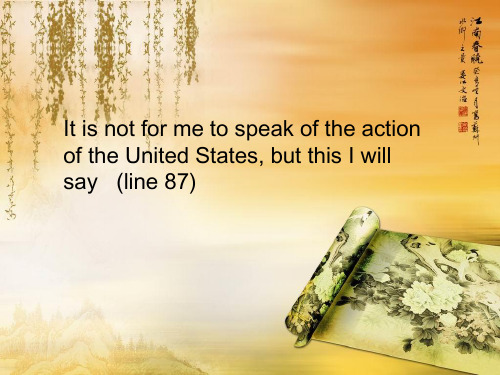
personification
This is no time to moralise on the follies of countries and Governments which have allowed themselves to be stuck down one by one (line94)
...by which he has so long thrived and prospered, and then the scene will be clear for final act, without... (line110)
...by which he has so long thrived and prospered, and then the scene will be clear for final act, without... (line110)
concise in language(语言简洁), balanced in structure, forceful in tone, and distinguished in significane (烘托意义)
Let us learn the lessons already taught by such cruel experience. Let us redouble our exertions, and strike with united strength while life and power remain. (line117) learn lesson [lɜːn] ['les(ə)n]
periodic sentence 掉尾句
if Hitler imagines that ……, he is woefully mistaken. (line 88)
高级英语第五课修辞

添 加 文 本
And like most escapist sprees, this one lasted until the money ran out, until the crash of the world economic structure at the end of the decade called the party to a halt and forced the revelers to sober up and face the problems of the new age.(para.4) metaphor
5/2/2014
Before long the movement had become officially recognized by the pulpit…implied promise that their owners would be rendered sexually irresistible. (para.8)
5/2/2014
pens象征年轻作家们的作品,而Babbitt try 指的是美国小说《巴比特》中主人公的特征 。
5/2/2014
As it become more and more fashionable throughout the country for young persons to defy the law and the conflagration of “flaming youth”, it was Greenwich village that fanned the flames.(para.8) metaphor 此处运用了暗喻,分别将年轻人的反叛和种种叛 逆行为比作了一场大火和助燃的小火柴。
此处运用了暗喻,将《美国的文明》一书比作 聚集点。
高级英语修辞手法总结归纳

高级英语修辞手法总结归纳修辞是语言使用中的重要技巧,通过巧妙运用各种修辞手法,能使语言表达更为生动、有力或富有韵味。
以下是对常见的高级英语修辞手法的总结归纳:一、隐喻与明喻隐喻是将一个词或短语用来暗示另一个事物,而明喻则是直接将一个事物与另一个事物进行比较。
例如,“他像一只狮子一样勇猛”(明喻)和“爱情是一座城堡”(隐喻)。
二、拟人及拟物拟人是赋予非生物或抽象事物以人的特性,而拟物则是赋予人或动物以非生物的特性。
例如,“河流唱着轻快的歌曲”(拟人)和“他的怒火如野兽般狂暴”(拟物)。
三、排比与对偶排比是将三个或以上结构相似、意义相近的词、短语或句子并列使用,以增强语势。
对偶则是将意义相对或相反的词、短语或句子进行对比,以突出主题。
例如,“生命在于运动,死亡在于静止”(对偶)和“他跨越了山岭,穿越了沙漠,走过了平原”(排比)。
四、反复与交错反复是将相同的词、短语或句子重复使用,以强调某种情感或主题。
交错则是将不同的词、短语或句子相互交替使用,以达到特定的表达效果。
例如,“永远、永远、永远不要放弃”(反复)和“是与否,对与错”(交错)。
五、借代与提喻借代是用一个事物的某一部分来代替整体或其他部分,而提喻则是用整体来代替某一部分或用类属来代替个体。
例如,“我要用笔墨写下永恒”(借代)和“人是一本书”(提喻)。
六、反讽与戏谑反讽是通过说反话或正话反说来达到讽刺的效果,戏谑则是用幽默诙谐的语言来戏弄或嘲笑某人或某事。
例如,“他是一个天生的傻瓜”(反讽)和“爱情是人生的蜜糖”(戏谑)。
七、矛盾修辞法矛盾修辞法是将相互矛盾的概念或形象结合在一起,以引起读者的思考或表达复杂的情感。
例如,“孤独的狂欢”,“死亡的生命”。
八、头韵与脚韵头韵是使用相同或相似的音韵开头,脚韵是使用相同或相似的音韵结尾。
例如,“美丽的美女”(头韵)和“生活是一首歌”(脚韵)。
九、夸张与弱化夸张是通过夸大事实或形象来强调某种情感或主题,弱化则是通过缩小事实或形象来淡化某种情感或主题。
《高级英语》中的几种常见的修辞方法论文
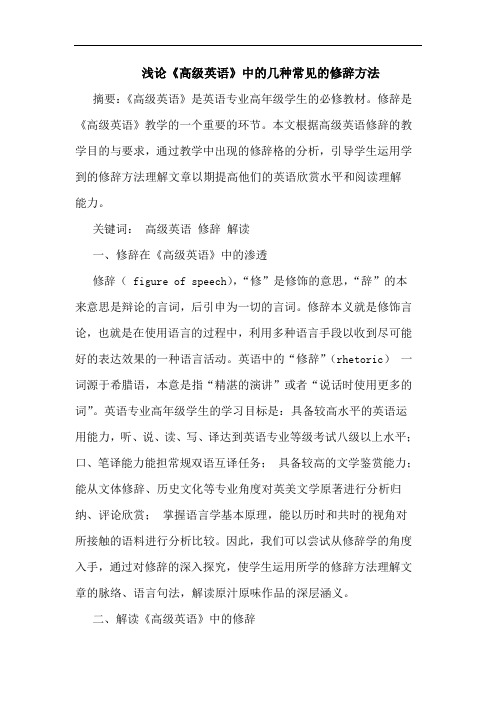
浅论《高级英语》中的几种常见的修辞方法摘要:《高级英语》是英语专业高年级学生的必修教材。
修辞是《高级英语》教学的一个重要的环节。
本文根据高级英语修辞的教学目的与要求,通过教学中出现的修辞格的分析,引导学生运用学到的修辞方法理解文章以期提高他们的英语欣赏水平和阅读理解能力。
关键词:高级英语修辞解读一、修辞在《高级英语》中的渗透修辞( figure of speech),“修”是修饰的意思,“辞”的本来意思是辩论的言词,后引申为一切的言词。
修辞本义就是修饰言论,也就是在使用语言的过程中,利用多种语言手段以收到尽可能好的表达效果的一种语言活动。
英语中的“修辞”(rhetoric)一词源于希腊语,本意是指“精湛的演讲”或者“说话时使用更多的词”。
英语专业高年级学生的学习目标是:具备较高水平的英语运用能力,听、说、读、写、译达到英语专业等级考试八级以上水平;口、笔译能力能担常规双语互译任务;具备较高的文学鉴赏能力;能从文体修辞、历史文化等专业角度对英美文学原著进行分析归纳、评论欣赏;掌握语言学基本原理,能以历时和共时的视角对所接触的语料进行分析比较。
因此,我们可以尝试从修辞学的角度入手,通过对修辞的深入探究,使学生运用所学的修辞方法理解文章的脉络、语言句法,解读原汁原味作品的深层涵义。
二、解读《高级英语》中的修辞(一)比喻类修辞1. 比喻( parable):即打比方。
著名文学理论家乔纳森·卡勒为比喻下的定义:比喻是认知的一种基本方式,通过把一种事物看成另一种事物而认识了它。
也就是说找到甲事物和乙事物的共同点,发现甲事物暗含在乙事物身上不为人所熟知的特征,而对甲事物有一个不同于往常的重新的认识。
比喻类修辞的共同特点是使事物的形象更加生动、逼真。
比喻类修辞通常包括:明喻( simile)暗喻( metaphor)等。
( 1)明喻( simile):是常用 as 或 like 等词将具有某种共同特征的两种不同事物连接起来的一种修辞手法。
高级英语第三版本册1-7课修辞整理
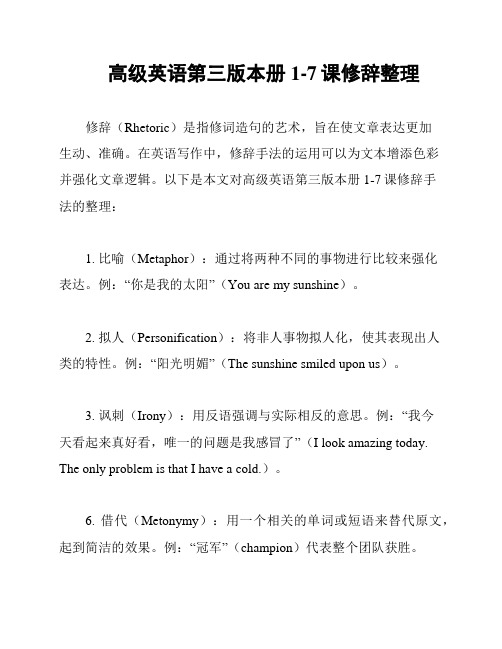
高级英语第三版本册1-7课修辞整理
修辞(Rhetoric)是指修词造句的艺术,旨在使文章表达更加
生动、准确。
在英语写作中,修辞手法的运用可以为文本增添色彩
并强化文章逻辑。
以下是本文对高级英语第三版本册1-7课修辞手
法的整理:
1. 比喻(Metaphor):通过将两种不同的事物进行比较来强化
表达。
例:“你是我的太阳”(You are my sunshine)。
2. 拟人(Personification):将非人事物拟人化,使其表现出人
类的特性。
例:“阳光明媚”(The sunshine smiled upon us)。
3. 讽刺(Irony):用反语强调与实际相反的意思。
例:“我今
天看起来真好看,唯一的问题是我感冒了”(I look amazing today. The only problem is that I have a cold.)。
6. 借代(Metonymy):用一个相关的单词或短语来替代原文,起到简洁的效果。
例:“冠军”(champion)代表整个团队获胜。
7. 倍受争议的说法(Euphemism):用含蓄、委婉和微妙的词语或说法来表达直接或难以接受的事情。
例:“真是一个有趣的人”(He is quite a character)。
以上是高级英语第三版本册1-7课修辞手法整理,希望对大家的英语写作有所帮助。
《高级英语》课程中的修辞研究

《高级英语》课程中的修辞研究修辞是一种修饰和增强语言表达的方式,帮助我们更好地传达和理解信息。
在《高级英语》课程中,修辞研究是一项重要的学习内容。
本文将介绍修辞研究的定义、重要性以及在课程中的应用。
修辞研究是对修辞手法和修辞效果进行分析和研究的学科。
修辞手法包括比喻、暗示、夸张等,可以通过增强语言的感染力和表现力来达到更好的表达目的。
修辞效果则是指修辞手法对听众或读者的心理产生的影响,如引发共鸣、增加说服力、激发情感等。
修辞研究在《高级英语》课程中具有重要意义。
它可以帮助学生更深入地理解文学作品和其他文本。
文学作品通常采用各种修辞手法来传达主题和情感,通过学习修辞研究,学生能够更好地解读这些作品,并欣赏作者的独特表达方式。
对于其他文本,如新闻报道、演讲稿等,学生也能通过运用修辞研究的知识来分析和评价其中的修辞手法和效果。
修辞研究也对学生的写作能力提升有积极影响。
学生可以通过学习不同的修辞手法和效果,将其运用到自己的写作中。
使用合适的修辞手法和效果不仅可以增加文章的吸引力,还能够更好地传达自己的观点和感受。
学习修辞研究可以帮助学生培养更高水平的写作技巧,提升他们的表达能力。
在《高级英语》课程中,修辞研究的应用也具有一定的挑战性。
学生需要掌握各种修辞手法和效果的定义和使用情境。
这需要他们通过大量的阅读和实践来积累经验,并与教师和同学进行交流和讨论。
学生需要通过课堂练习和写作任务来运用修辞研究的知识。
这需要他们不断地思考和实践,以提升自己的修辞技巧。
《高级英语》课程中的修辞研究对于学生的综合语言能力的提升至关重要。
通过学习修辞研究,学生可以更好地理解文本,提高写作能力,并培养批判思维和分析能力。
这将对他们今后的学习和职业发展产生积极的影响。
在《高级英语》课程中加强修辞研究的教学内容和实践是非常必要的。
现代大学英语第五册修辞汇总
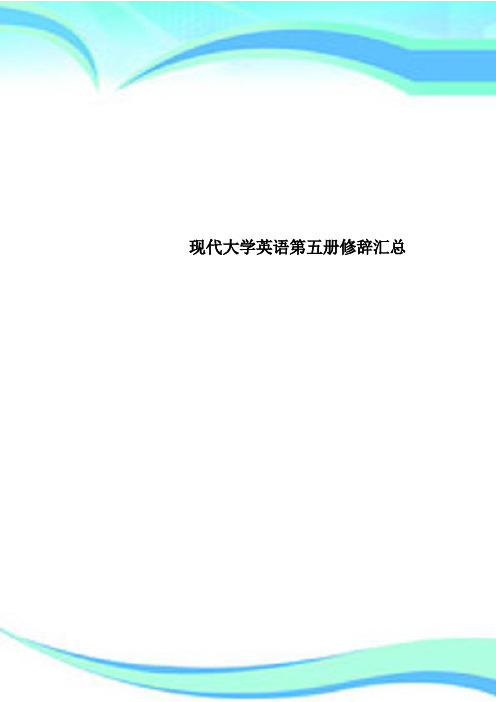
现代大学英语第五册修辞汇总————————————————————————————————作者:————————————————————————————————日期:高级英语第五册修辞方法(Rhetorical Device)序号修辞类别定义/特点1 Simile(明喻)是以两种具有相同特征的事物和现象进行对比,表明本体和喻体之间的相似关系,两者都在对比中出现。
常用比喻词like, as, as if, as though等。
2 Metaphor(隐喻)这种比喻不通过比喻词进行,而是直接将甲事物当作乙事物来描写,甲乙两事物之间的联系和相似之处是暗含的。
3 Allusion(暗引/引喻)其特点是不注明来源和出处,一般多引用人们熟知的关键词或词组,将其融合编织在作者的话语中。
引用的东西包括典故、谚语、成语、格言和俗语等。
英语引用最多的是源出《圣经》故事以及希腊、罗马神话、《伊索寓言》和那些源远流长的谚语、格言等。
4 Parody(仿拟) 根据家喻户晓的成语或谚语,临时更换其中的某个部分,造成新的成语或谚语;或者根据古今名言警句,在保持其原句不变的情况下,更换其中部分词语,这种修辞方式叫仿拟。
5 Metonymy(转喻/借代)是指两种不同事物并不相似,但又密不可分,因而常用其中一种事物名称代替另一种。
例如:the white house---the President, the crown--- the king/queen, purse--- money6 Synecdoche(提喻)又称举隅法主要特点是局部代表全体,或以全体喻指部分,或以抽象代具体,或以具体代抽象。
7 Transferredepithet (转类形容词/移就)采用表示性质和特征的形容词或相当于形容词的词来修饰、限定与它根本不同属性的名词。
8 Oxymoron(矛盾修辞法 acompressedparadox) 用两种不相调和,甚至截然相反的特征来形容一项事物,在矛盾中寻求哲理,以便收到奇警的修辞效果,产生特殊的深刻含义的一种修辞手段。
《高级英语》教材中的修辞格赏析

- 110-校园英语 / 基础教育研究《高级英语》教材中的修辞格赏析河北省承德市翠桥中学/孔敏【摘要】英语修辞越来越多的为人们所应用于报纸,广播,杂志,文学作品以及日常生活中。
本文拟从《高级英语》教材中的一些修辞手法入手,从英语意象方面进行分析、赏欣,使读者认识到英语修辞在语言表达中的重要作用。
【关键词】修辞 修辞格 赏析修辞(rhetoric)就是在应用语言的时候,根据特定的目的,精心的选择语言的过程。
运用各种语言文字材料,各种表现手法,来恰当地表达思想和感情,力求把话说得更正确、明白,使文章更加的生动、精彩。
修辞格(figures of speech)是在修饰语言的过程中,形成的具有独特的表达效果的比较固定的格式,也称修辞手段,修辞方式等。
恰当的使用修辞格,可以使语言生动形象,意蕴优美,更具说服力和感染力。
现从英语意象方面就《高级英语》教材中的修辞格进行发掘和赏欣。
1.明喻 (simile)。
(1) I see also the dull, drilled, docile, brutish masses of the Hun soldiery plodding on like a swarm of crawling locusts. (Speech on Hitler’s Invasion of the U.S.S.R.)(2) The wind (Hurricane Camile) sounded like the roar ofa train passing a few yards away. (Face to Face with Hurricane Camile)句(1)摘自于英国首相丘吉尔《关于希特勒入侵苏联的讲话》。
这位强悍的英国首相把德国凶残,野蛮的士兵比作成群结队,且对农作物可以造成灭顶之灾的蝗虫。
因为两者有着共同的特点——制造毁灭,深刻的揭露并批判了德国法西斯的凶残。
句(2)中作者把卡米尔号飓风的声响(the sound of the wind)比作在身边呼啸而过的列车发出的响声(the roar of a passing train),非常的贴切、生动、形象。
浅析《高级英语》中的修辞
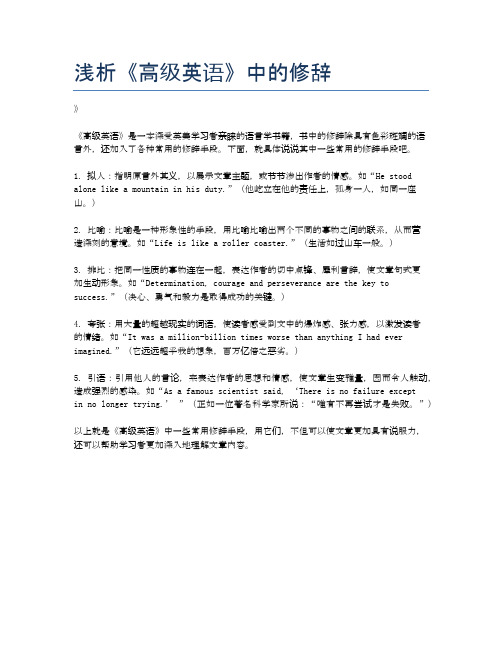
浅析《高级英语》中的修辞》《高级英语》是一本深受英美学习者亲睐的语言学书籍,书中的修辞除具有色彩斑斓的语言外,还加入了各种常用的修辞手段。
下面,就具体说说其中一些常用的修辞手段吧。
1. 拟人:指明原言外其义,以展示文章主题,或节节渗出作者的情感。
如“He stood alone like a mountain in his duty.”(他屹立在他的责任上,孤身一人,如同一座山。
)2. 比喻:比喻是一种形象性的手段,用比喻比喻出两个不同的事物之间的联系,从而营造深刻的意境。
如“Life is like a roller coaster.”(生活如过山车一般。
)3. 排比:把同一性质的事物连在一起,表达作者的切中点锋、犀利言辞,使文章句式更加生动形象。
如“Determination, courage and perseverance are the key to success.”(决心、勇气和毅力是取得成功的关键。
)4. 夸张:用大量的超越现实的词语,使读者感受到文中的爆炸感、张力感,以激发读者的情绪。
如“It was a million-billion times worse than anything I had ever imagined.”(它远远超乎我的想象,百万亿倍之恶劣。
)5. 引语:引用他人的言论,来表达作者的思想和情感,使文章生变雅量,因而令人触动,造成强烈的感染。
如“As a famous scientist said, ‘There is no failure exceptin no longer trying.’ ”(正如一位著名科学家所说:“唯有不再尝试才是失败。
”)以上就是《高级英语》中一些常用修辞手段,用它们,不但可以使文章更加具有说服力,还可以帮助学习者更加深入地理解文章内容。
浅论《高级英语》中的几种常见的修辞方法

浅论《高级英语》中的几种常见的修辞方法作者:肖利华来源:《神州》2012年第36期摘要:《高级英语》是英语专业高年级学生的必修教材。
修辞是《高级英语》教学的一个重要的环节。
本文根据高级英语修辞的教学目的与要求,通过教学中出现的修辞格的分析,引导学生运用学到的修辞方法理解文章以期提高他们的英语欣赏水平和阅读理解能力。
关键词:高级英语修辞解读一、修辞在《高级英语》中的渗透修辞( figure of speech),“修”是修饰的意思,“辞”的本来意思是辩论的言词,后引申为一切的言词。
修辞本义就是修饰言论,也就是在使用语言的过程中,利用多种语言手段以收到尽可能好的表达效果的一种语言活动。
英语中的“修辞”(rhetoric)一词源于希腊语,本意是指“精湛的演讲”或者“说话时使用更多的词”。
英语专业高年级学生的学习目标是:具备较高水平的英语运用能力,听、说、读、写、译达到英语专业等级考试八级以上水平;口、笔译能力能担常规双语互译任务;具备较高的文学鉴赏能力;能从文体修辞、历史文化等专业角度对英美文学原著进行分析归纳、评论欣赏;掌握语言学基本原理,能以历时和共时的视角对所接触的语料进行分析比较。
因此,我们可以尝试从修辞学的角度入手,通过对修辞的深入探究,使学生运用所学的修辞方法理解文章的脉络、语言句法,解读原汁原味作品的深层涵义。
二、解读《高级英语》中的修辞(一)比喻类修辞1. 比喻( parable):即打比方。
著名文学理论家乔纳森·卡勒为比喻下的定义:比喻是认知的一种基本方式,通过把一种事物看成另一种事物而认识了它。
也就是说找到甲事物和乙事物的共同点,发现甲事物暗含在乙事物身上不为人所熟知的特征,而对甲事物有一个不同于往常的重新的认识。
比喻类修辞的共同特点是使事物的形象更加生动、逼真。
比喻类修辞通常包括:明喻( Simile)暗喻( Metaphor)等。
( 1)明喻( Simile):是常用 as 或 like 等词将具有某种共同特征的两种不同事物连接起来的一种修辞手法。
高级英语的十九种修辞和高英1-5课总结张汉熙
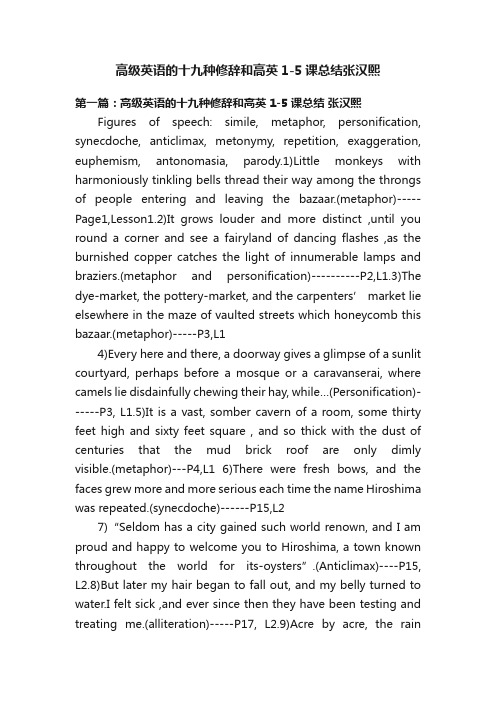
高级英语的十九种修辞和高英1-5课总结张汉熙第一篇:高级英语的十九种修辞和高英1-5课总结张汉熙Figures of speech: simile, metaphor, personification, synecdoche, anticlimax, metonymy, repetition, exaggeration, euphemism, antonomasia, parody.1)Little monkeys with harmoniously tinkling bells thread their way among the throngs of people entering and leaving the bazaar.(metaphor)-----Page1,Lesson1.2)It grows louder and more distinct ,until you round a corner and see a fairyland of dancing flashes ,as the burnished copper catches the light of innumerable lamps and braziers.(metaphor and personification)----------P2,L1.3)The dye-market, the pottery-market, and the carpenters’ market lie elsewhere in the maze of vaulted streets which honeycomb this bazaar.(metaphor)-----P3,L14)Every here and there, a doorway gives a glimpse of a sunlit courtyard, perhaps before a mosque or a caravanserai, where camels lie disdainfully chewing their hay, while…(Personification)------P3, L1.5)It is a vast, somber cavern of a room, some thirty feet high and sixty feet square , and so thick with the dust of centuries that the mud brick roof are only dimly visible.(metaphor)---P4,L1 6)There were fresh bows, and the faces grew more and more serious each time the name Hiroshima was repeated.(synecdoche)------P15,L27)“Seldom has a city gained such world renown, and I am proud and happy to welcome you to Hiroshima, a town known throughout the world for its-oysters”.(Anticlimax)----P15, L2.8)But later my hair began to fall out, and my belly turned to water.I felt sick ,and ever since then they have been testing and treating me.(alliteration)-----P17, L2.9)Acre by acre, the rainforest is being burned to create fast pasture for fast-food beef.(alliteration)-----P30,L310)According to our guide, the biologist Tom Lovejoy, there are more different species of birds in each square mile of the Amazon than exist in all of North America-which means we are silently thousands of songs we have ever heard.(metonymy)----P31,L3.11)What should we feel toward these ghosts in the sky?(metaphor)---P32,L3.12)Have you ever seen a lame animal ,perhaps dog run over by some careless person rich enough to own a car ,sidle up to someone who is ignorant enough to be kind of him?(metaphor)13)And she stops and tries to dig a well in the sand with her toe.(Exaggeration)----P58, L4.14)I feel my whole face warming from the heat waves it throws out.(Exaggeration)15)After I tripped over it two or three times he told me to just call him Hakim-a-barber.(metaphor)-------P60,L4.16)“Maggie’s brain is like an elephant’s”.Wangero said ,laughing.(Ironic)—P62,L4.17)You didn’t even have to look close to see where hands pushing the dasher up and down to make butter had left a kind of sink inthe wood.(metaphor)----P62,L4.18)“Mama,”Wangero said sweet as a bird.“can I have these old quilts?”(Simile)---P63, L4.19)She gasped like a bee had stung her.(simile)20)Churchill, he reverted to this theme, and I asked whether for him, the arch anti-communist, this was not bowing down in the House of Rimmon.(metaphor)21)If Hitler invaded Hell and would make at least a favorable reference to the Devil in the House of Commons.(exaggeration)----P79,L5.22)But all this fades away before the spectacle which is now unfolding.(metaphor)I see also the dull, drilled, docile, brutish masses of the Hun soldiery plodding on like a swarm of crawling locusts.(simile) 24)I see the Russian soldiers standing on the threshold of their native land, guarding the fields which their fathers have tilled from time immemorial.(Metaphor)----P79, L5.25)I see the German bombers and fighters in the sky ,street smarting from many a British whipping to find what they believe is an easier and a safer prey.(Metaphor)---P80, L5.26)We will never parley;we will never negotiate with Hitler or any of his gang.We shall fight him by land, we shall fight him by sea, and we shall fight him in the air.(Parallelism)27)Just as the industrial Revolution took over an immense range of tasks from men’s muscles and enorm ously expanded productivity.(Metonymy)英语中有19种修辞手法,它们分别是:Simile明喻、Metaphor 隐喻,暗喻、Metonymy 借喻,转喻、Synecdoche 提喻、Synaesthesia通感,联觉,移觉、Personification 拟人、Hyperbole 夸张、Parallelism 排比,平行、Euphemism 委婉,婉辞法、Allegory 讽喻,比方、Irony 反语、Pun 双关、Parody仿拟、Rhetorical question 修辞疑问、Antithesis 对照,对比,对偶、Paradox 隽语、Oxymoron反意法,逆喻、Climax 渐进法,层进法、Anticlimax渐降法。
修辞总结高英一册5-6课

Lesson 5 Speech on Hitler’s Invasion of the U. S. S. R.1.Churchill ,he reverted to this theme, and I asked whether for him, thearch anti-communist ,this was not bowing down in the House of Rimmon.(metaphor, allusion)2.eg: … but can you doubt what our policy will be? (rhetorical question)3.We have but one aim and one single, irrevocable purpose. (repetition)4.The past, with its crimes, its follies, and its tragedies, flashes away.(periodical sentence)5.I see the Russian soldiers standing on the thresthold of their native land,guarding the fields which their fathers have tilled from time immemorial. (metaphor)6.I see …I see……. (parallelism)7.I see advancing upon all this in hideous onslaught the Nazi warmachine, with its clanking, heel-clicking, dandified Prussian officers, it crafty expert agents fresh from the cowing and tying down of a dozen countries. (onomatopoeia)8.I see also the dull, drilled, docile, brutish masses of the Hun soldieryplodding on like a swarm of crawling locusts. (alliteration, simile) 9.I see the German bombers and fighters in the sky, still smarting frommany a British whipping, delighted to find what they believe is an easier and a safer prey.(metaphor)10.F rom this nothing will turn us---nothing. (repetition)11.W e will never parley, we will never negotiate with Hitler or any of hisgane. (repetition)12.W e shall fight him by land, we shall fight him by sea, we shall fighthim in the air, until, with God’s help, we have rid the earth of his shadow and liberated its peoples from his yoke. (parallelism, metaphor) 13.A ny man or state who fights on against Nazidom will have our aid. Anyman or state who marches with Hitler is our foe…(periodical sentence, antithesis)14.B ehind all this glare, behind all this storm, I see that small group ofvillainous men who plan, organize, and launch this cataract of horrors upon mankind…behind all this glare behind all this storm (metaphor, Parallelism)15.T he scene will be clear for the final act. (metaphor)16.…just as the cause of any Russian fighting for his hearth and home isthe cause of free men and free peoples in every quarter of the globe.(hearth暗喻,alliteration)17.I see the Russian soldiers standing … I see them guarding... I see theten thousand villages... I see that small group… (Parallelism)18.L et us learn the lessons already taught by such cruel experience. Let usredouble our exertions… (Parallelism)19.W e have but one aim and one single, irrevocable purpose. (Repetition)20.H e has so long thrived and prospered. (Repetition)21.W e will never parley, we will never negotiate... (Repetition)22.H e hopes....he hopes..... (parallelism)23.T he Nazi regime is devoid of all theme and principle except appetiteand racial domination. (metaphor)Lesson 6 Blackmail1.piggy eyes (metaphor, ridicule)2.beady eyes (metaphor)3.The obese body shook in an appreciative chuckle. (onomatopeia)4.His wife shot him a swift, warning glance. (metaphor, transferredepithet)5.You drove there in your fancy Jaguar, and you took a lady friend.(euphemism)6.The Duchess of Croydon kept firm, tight rein on her racing mind.(metaphor)7.Her voice was a whiplash. (metaphor)8.Eyes bored into him. (metaphor)9.The house detective clucked his tongue reprovingly. (onomatopeia)10.I n what conceivable way does our car concern you? (rhetoricalquestion)。
《高级英语》课程中的修辞研究

《高级英语》课程中的修辞研究修辞是语言运用中非常重要的一部分,它能够帮助我们表达更加精练、生动和有力的意思。
在《高级英语》课程中,修辞研究是一个十分重要的内容,它不仅帮助学生更好地理解英语文学作品,还能够提高学生的写作水平和语言表达能力。
本文将探讨《高级英语》课程中修辞研究的重要性,以及在课程中如何教授和运用修辞知识。
我们需要理解修辞在英语中的作用。
修辞是指通过某些特定的语言手段和表达方法来增强语言表达的效果,使语言更加生动、形象、感染力强,达到更好的表达和传达效果。
在英语文学作品中,修辞常常被用来营造氛围,描绘人物形象,传递作者的情感,激发读者的共鸣等。
学习和掌握修辞知识对于理解和欣赏英语文学作品至关重要。
对于学生而言,修辞研究有助于提高他们的语言表达能力。
通过学习不同的修辞手法,学生可以丰富自己的词汇量,掌握更多的表达方式,提高写作的表达力和说话的能力。
修辞研究也可以帮助学生更好地理解诗歌、小说和戏剧等文学作品,从而提升他们的文学鉴赏能力和批判性思维能力。
在《高级英语》课程中,教师可以通过多种方式教授修辞知识。
教师可以通过讲解和示范的方式向学生介绍不同的修辞手法,例如比喻、隐喻、排比、对偶等。
教师还可以通过分析文学作品中的修辞手法,让学生在实际的语境中感受修辞的魅力。
教师还可以设计一些学生参与的活动,例如让学生在课堂上编写修辞的句子或段落,或者让学生分析诗歌或小说中的修辞手法,从而提高学生对修辞的理解和运用能力。
除了在课堂教学中注重修辞研究,教师还可以设计相关的练习和作业来巩固学生的知识,例如让学生写一篇修辞丰富的作文,或者让学生分析一篇文学作品中的修辞手法等。
通过这些练习和作业,学生可以更好地理解和掌握修辞知识,提高他们的语言表达和写作能力。
教师还可以引导学生积极参与讨论和分享,在课堂上讨论文学作品中的修辞手法,学生可以通过和同学的交流,不断扩展自己的视野,理解不同的解读和观点,从而在课程中获得更加丰富和深入的体验。
- 1、下载文档前请自行甄别文档内容的完整性,平台不提供额外的编辑、内容补充、找答案等附加服务。
- 2、"仅部分预览"的文档,不可在线预览部分如存在完整性等问题,可反馈申请退款(可完整预览的文档不适用该条件!)。
- 3、如文档侵犯您的权益,请联系客服反馈,我们会尽快为您处理(人工客服工作时间:9:00-18:30)。
1. Irony(反讽) is the use of words that the opposite of what you really mean, often as a joke and with a tone of voice that shows this.(1)I award this champion only after laborious research and incessant prayer. (L.1, Para.5)(2)It is as if some titanic and aberrant genius, uncompromisingly inimical to man, had devotedall the ingenuity of Hell to the making of them. (L.14, Para.5)(3)It is incredible that mere ignorance should have achieved such masterpieces of horror.(L.11,Para.6)2. Sarcasm(讽刺) is a way of using words that are the opposite of what you mean in order to be unpleasant to somebody or to make fun of them.(1) Obviously, if there were architects of any professional sense or dignity in the region, they would have perfected a chalet to hug the hillsides… (L.6, Para.3)(2) They are incomparable in color, and they are incomparable in design. (L.13, Para.5)3. Ridicule(嘲讽) refers to unkind comments that make fun of somebody/something or make them look silly.(1) When it has taken on the patina of the mills it is the color of an egg long past all hope or caring. (L.2, Para.4)(2) They made it perfect in their own sight by putting a completely impossible penthouse, painteda staring yellow, on top of it. (L.15, Para.8)4. Understatement(低调陈述) is the opposite of hyperbole. It achieves its effect of emphasizing a fact by deliberately understating it, impressing the listeners or the readers more by what is merely implied or left unsaid than by bare statement.(1) The country itself is not uncomely, despite the grime of the endless mills. (L.1, Para.3)5. Antonomasia(换称) is a figure of speech that involves the use of epithet or title in place of a name, and also the use of a proper name in place of a common noun.(1) Safe in a Pullman, I have whirled through the gloomy, God-forsaken villages of Iowa and Kansas, and the malarious tidewater hamlets of Georgia. (L.7, Para5)6. Antithetical Contrast(反衬对比) is a figure of speech combined by antithesis and contrast, and often has two sharply contrasting ideas balanced across a sentence (or neighboring sentences) (1) Here was the very heart of industrial America, the center of its most lucrative and characteristic activity, the boast and pride of the richest and grandest nation ever seen on earth—and here was a sense so dreadfully hideous, so intolerably bleak and forlorn that it reduced the whole aspiration of man to a macabre and depressing joke. (L.5, Para.1)(2) Here was wealth beyond computation, almost beyond imagination—and here were habitations so abominable that they would have disgraced a race of alley cats. (L.10, Para1)7. Hyperbole(夸张) is a way of speaking or writing that makes something should be better, more exciting, dangerous, etc. than it really is.(1) What I allude to is the unbroken and agonizing ugliness, the sheer revolting monstrousness, of every house in sight. (L.2, Para.2)(2) From East Liberty to Greensburg, a distance of twenty-five miles, there was not one in sight from the train that did not insult and lacerate the eye. (L.3, Para.2)(3) But in Westmoreland they prefer that uremic yellow, and so they have the most loathsome towns and villages ever seen by mortal eye. (L.8, Para.4)(4) I have seen, I believe, all of the most unlovely towns of the world; they are all to be found in the United States. (L.2, Para.5)(5) It is as if some titanic and aberrant genius, uncompromisingly inimical to man, had devoted all the ingenuity of Hell to the making of them. (L.14, Para.5)8. Metaphor(暗喻) is a figure of speech that describes something by referring to it as something else, in order to show that the two things have the same qualities and to make the description more powerful.(1) Here was the very heart of industrial America… (L.5, Para.1)(2)…on their low sides they bury themselves swinishly in the mud. ((L.17, Para. 3)(3) And one and all they are streaked in grime, with dead and eczematous patches of paint peeping through the streaks. (L.20, Para.3)(4) The effect is that of a fat woman with a black eye. It is that of a Presbyterian grinning. (L.17, Para.8)(5) Out of the melting pot emerges a race which hates beauty as it hates truth. (L.3, Para.9)9. Simile(明喻) is a figure of speech that often uses the words like or as, etc. to make a comparison between to unlike elements having at least one quality or characteristic in common.(1) …one blinked before them as one blinks before a man with face shot away. (L.7, Para.2)(2) …a crazy little church just west of Jeannette, set like a dormer window on the side of a bare leprous hill… (L.9, Para.2)(3) …a steel stadium like a huge rat-trap somewhere further down the line. (L.12, Para.2)10. Rhetorical Question(修辞疑问句) is a figure of speech in the form of a question posed for its persuasive effect without the expectation of a reply. Rhetorical question encourages the listener to think about what the answer (often obvious) to the question might be.(1) But what have they done? (L.11, Para.3)(2) Was it necessary to adopt that shocking color? (L.4, Para.4)(3) Are they so frightful because the valley is full of foreigners—dull, intense brutes, with no love of beauty in them? (L.1, Para.6)(4) Then why did not these foreigners set up similar abominations in the countries that they came from? (L.2, Para.6)。
